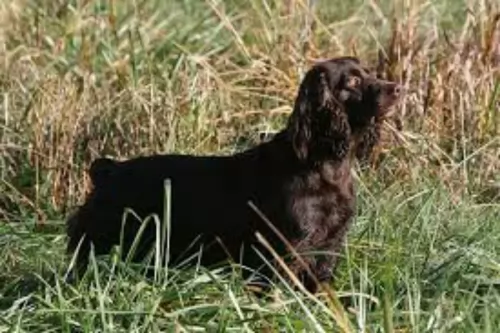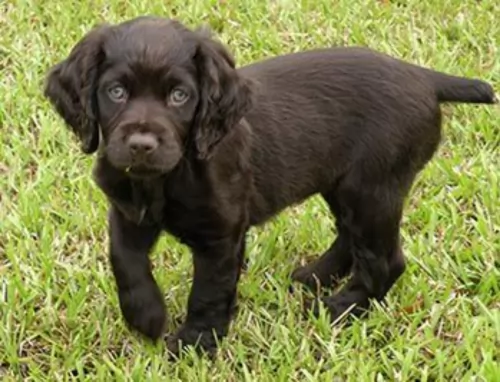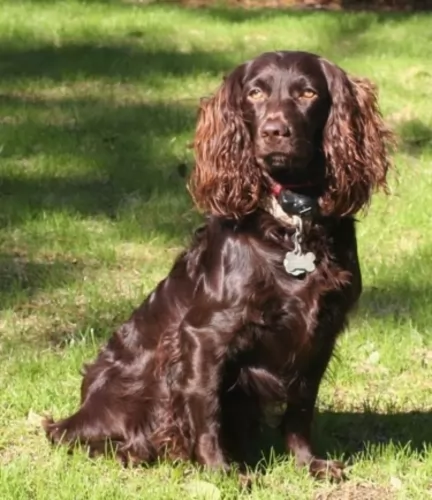 Petzlover
PetzloverBoykin Spaniel is originated from United States but Tweed Water Spaniel is originated from United Kingdom. Boykin Spaniel may grow 14 cm / 5 inches shorter than Tweed Water Spaniel. Boykin Spaniel may weigh 14 kg / 30 pounds lesser than Tweed Water Spaniel. Boykin Spaniel may live 4 years more than Tweed Water Spaniel. Both Boykin Spaniel and Tweed Water Spaniel has almost same litter size. Both Boykin Spaniel and Tweed Water Spaniel requires Moderate Maintenance.
 The Boykin Spaniel was originally bred by South Carolina hunters as the perfect dog for hunting wild bird during the early 1900s. Alexander White of Spartanburg found a short, well built dog and named him Dumpy. The dog was given to a certain L. Whitaker Boykin and a similar dog in looks was found and mated with Dumpy on Boykin’s Pine Grove plantation. Whitaker Boykin was particularly looking for a special kind of hunting dog breed that could wade into swamplands and into water.
The Boykin Spaniel was originally bred by South Carolina hunters as the perfect dog for hunting wild bird during the early 1900s. Alexander White of Spartanburg found a short, well built dog and named him Dumpy. The dog was given to a certain L. Whitaker Boykin and a similar dog in looks was found and mated with Dumpy on Boykin’s Pine Grove plantation. Whitaker Boykin was particularly looking for a special kind of hunting dog breed that could wade into swamplands and into water.
Boykin’s spaniels were popular in South Carolina before World War II and later, in 1977, the Boykin Spaniel Society was founded to ensure the breeding standards of the dog. In 1985, the Boykin Spaniel was declared the state dog of South Carolina and recognized by the American Kennel Club in 2009.
The Tweed Water Spaniel is extinct. Fortunately, we have some beautiful dogs that come from this dog. It is involved in bringing about the Golden Retriever. They were athletic dogs from Berwick-upon-Tweed.
It was in 1816 that Richard Lawrence wrote of the origins of the Tweed Water Spaniel which is thought to have come from the Newfoundland dog. It is believed that huntsmen used these dogs to retrieve the ducks and geese they shot. This purebred dog wasn’t recognized by the American Kennel Club or the FCI.
 You can’t miss the medium-sized Boykin Spaniel with his magnificent coat in different shades of brown. When he gleams in the sun he looks like chocolate. This type of Spaniel is a bit bigger than the English Cocker Spaniel, but he is heavier, weighing between 13 to 18kg. He has large, floppy feathery ears and the tail has always been docked to give him that distinct look, but now with rules and regulations, the tail is often left so that it is long and feathery. The height of this dog at the withers is 39 to 43cm.
You can’t miss the medium-sized Boykin Spaniel with his magnificent coat in different shades of brown. When he gleams in the sun he looks like chocolate. This type of Spaniel is a bit bigger than the English Cocker Spaniel, but he is heavier, weighing between 13 to 18kg. He has large, floppy feathery ears and the tail has always been docked to give him that distinct look, but now with rules and regulations, the tail is often left so that it is long and feathery. The height of this dog at the withers is 39 to 43cm.
The length of the dog’s coat varies somewhat because of the different breeds from the past. Essentially the coat is medium length and wavy to curly with light feathering around the legs, ears, chest and stomach.
The Boykin Spaniel is social and he makes an excellent family pet. He is good around children and other dogs, and with training and socialization he becomes even more amicable and obedient.
The Tweed Water Spaniel had a curly liver-colored coat with a long feathery tail and medium-sized floppy ears. It is thought that he was a large dog standing at between 50 to 60cm in height and weighing between 25 and 32kg.
The Tweed Water Spaniel, regarded as a moderate shedder, would have required being brushed from time to time.
The Tweed Water Spaniel had so many wonderful characteristics that made him a splendid family pet. He was smart and able to learn basic commands. He was also very playful and would have made a robust, playful friend for children.
They made gentle, loyal companions for their human family and wee able to get on well with other pets in the home. They would have got on well with other pets in the home too and it is believed that they were amicable enough to have been suited as a therapy dog.
They made good watchdogs too, being active and alert, just loving the outdoors. They’re well suited to life in the country or a home with a big garden and wouldn’t like to be cooped up on a small property in the city.
 The Boykin Spaniel is a diverse breed. The characteristics of the dog aren’t set in stone. He is a hunting dogs with boundless energy and enthusiasm. He is an intelligent breed and responds well to training and is obedient to your commands. He is all about fun and excitement and he is guaranteed to make a splendid companion.
The Boykin Spaniel is a diverse breed. The characteristics of the dog aren’t set in stone. He is a hunting dogs with boundless energy and enthusiasm. He is an intelligent breed and responds well to training and is obedient to your commands. He is all about fun and excitement and he is guaranteed to make a splendid companion.
Active and social, he is going to need input from his owners in terms of exercise and mental stimulation. He isn’t a dog to just ignore and in exchange for love and care, he is going to be a loving, loyal and fun companion for you.
Intelligent, courageous and friendly, it seems such a pity that the Tweed Water Spaniel is extinct because he seemed to have been a super dog.
Luckily we have dogs such as the Golden Retriever that remind us of what a good family pet he was.
 The Boykin Spaniel is a healthy breed with a life span of 14 to 16 years. There are some diseases that you want to be aware of with your Boykin Spaniel.
The Boykin Spaniel is a healthy breed with a life span of 14 to 16 years. There are some diseases that you want to be aware of with your Boykin Spaniel.
Always be aware of Hip Dysplasia as it can reduce your pet’s quality of life.. In dogs with hip dysplasia, the hip joint doesn’t to develop properly and deterioration sets in and your pet can lose function of the joint. You’ll notice your pet battling to stand up after lying down. The frightening this is that some dogs begin to show signs of hip dysplasia as early as 4 months of age.
The Boykin Spaniel’s most common health problems apart from hip dysplasia are patellar luxation and juvenile cataracts.
Because this dog is extinct and because no health records were kept, it is assumed that he would have had the same health issues as a Golden Retriever. Typical health issues of this dog would include hip dysplasia, obesity, cardiomyopathy.
This is a preventable disease in dogs, and if dog owners only knew what damage they do by allowing their dogs to become obese. Certainly, obesity shortens a dog’s life.
It is mind-boggling to realize that scientific evidence tells us that fat tissue is biologically active, secreting inflammatory hormones and also putting stress on the dog’s joints. Obese dogs develop an increased risk for cancer, diabetes and heart disease.
Dilated cardiomyopathy is a disease of the heart muscle characterized by an enlarged heart. The heart doesn’t function properly with the ventricles becoming enlarged. The muscle wall of the heart becomes thinner and this causes the heart to lose the ability to pump blood to the rest of the body.
Fluid can accumulate in the lungs. This can all lead to congestive heart failure. Your dog will battle to breathe, be panting and coughing, have an extended abdomen and may even collapse.
 The Boykin Spaniel has been a gun dog and because he is energetic, he will need plenty of exercise and activities. Take him for walks or allow him to swim in the farm dam if you live in the country. He isn’t a dog to leave on his own in your backyard as he needs exercise as well as mental stimulation to keep him from becoming frustrated and developing destructive habits.
The Boykin Spaniel has been a gun dog and because he is energetic, he will need plenty of exercise and activities. Take him for walks or allow him to swim in the farm dam if you live in the country. He isn’t a dog to leave on his own in your backyard as he needs exercise as well as mental stimulation to keep him from becoming frustrated and developing destructive habits.
The Boykin’s hair will need to be brushed as least twice a week to prevent it from matting, particularly if he is a country-living dog, in and out of water and running through long grass. He is not a heavy shedder but his shedding is seasonal. As a long eared dog, he will need to have his ears checked to prevent infection.
Other grooming habits to get used to with your Boykin Spaniel are having his nails trimmed and brushing his teeth at least 2 or 3 times a week with special dog toothpaste and brush.
Boykin Spaniel owners who know the breed well say that there is nothing better than feeding your dog raw meat with vegetables and rice. Of course, not everyone can afford to feed their pets raw meat every day, and that’s alright. Just make sure that every now and then you include raw meat into your pet’s diet.
The very best commercially produced dog foods can also be good for your pet. If in doubt, speak to your veterinarian about the best food for your active, energetic pet. Never, ever deprive your pet of fresh, cool water throughout the day and night.
The Tweed Water Spaniel had floppy ears and as a water dog, he may well have had ear infections in his day. One wonders if dog owners of that time were aware of the need to have the inside of the dog's ears clean and dry.
The Tweed Water Spaniel would have needed to have his eyes checked too. Pus in the eyes could indicate the dog wasn’t well.
The Tweed Water Spaniel would have required a lot of exercise and would have loved long walks and hikes. He wouldn’t need an invitation to go swimming and if you threw a stick or ball into the water, he’d be right there, jumping right in.
If you were a person that thrived on an active life this dog would have been for you.
Nobody really knows what the Tweed Water Spaniel would have eaten in the 19th century when he was around. He’s the kind of dog you’d have to be careful with as he could put on weight easily.
If he were around today, you’d give him a high quality commercially manufactured food that was designed for large, active dogs. No doubt in those days, the owners gave the dog scraps off the table.
Today if you wanted to give your dog home-made food, you’d stick to healthy foods such as boiled chicken, brown rice or pasta and some healthy vegetables such as spinach, carrots and sweet potatoes.
Puppies would have required 4 bowls of food a day while the adult dog would require 2 meals a day.